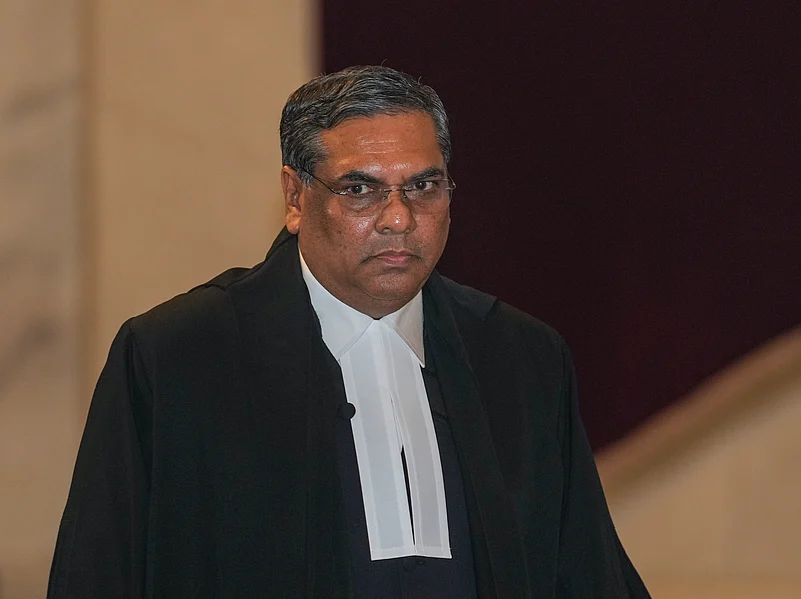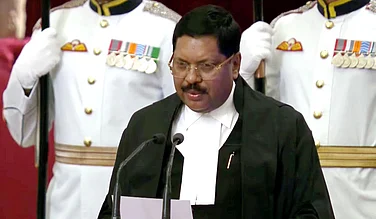Justice Sanjiv Khanna라이브 바카라 tenure as the 51st Chief Justice of India, from November 2024 to May 2025, was short but distinguished. With his judgements in the electoral bond and on hate speech issues, Justice Khanna cemented his reputation as a fair and meticulous judge.
Known for his calm demeanour, Justice Khanna was on the bench deciding some of India라이브 바카라 biggest constitutional debates of the time. He called for transparency in electoral funding, upheld the government라이브 바카라 abrogation of Article 370, spoke up against hate speech, and clamped down on economic offenders. On May 13, he announced he would not be taking any official post-retirement assignments.
“I will not accept any post-retirement post ...perhaps will do something with law,” he said.
Ten key judgments delivered by Justice Khanna:
Article 370 Verdict (2023)
Justice Khanna was part of the Constitution Bench that upheld the Union Government라이브 바카라 decision to abrogate Article 370, which had granted Jammu and Kashmir special status. In his concurring opinion, he said that Article 370 was designed to be a temporary measure within India라이브 바카라 asymmetric federalism and was never meant to be permanent. While affirming the legal validity of the Presidential Orders effecting the abrogation, he left open the question of the legality of bifurcating the state into two Union Territories.
Electoral Bonds Case (2024)
Justice Khanna was instrumental in the judgment striking down the Electoral Bonds Scheme, which had allowed anonymous political donations. He highlighted that the scheme violated the right to information under Article 19(1)(a) of the Constitution. By permitting anonymous donations, even when routed through banking systems, the scheme undermined transparency in electoral funding, which is crucial for a healthy democracy. His ruling underscored the importance of ensuring that voters are well-informed about the financial backing of political parties.
Hate Speech–Amish Devgan Case (2020)
In this case, Justice Khanna ruled on the controversial remarks made by journalist Amish Devgan about Sufi saint Moinuddin Chishti. He clarified that hate speech, defined by its context, intent, and potential harm, does not fall under the protection of free speech guaranteed by the Constitution. His ruling offered valuable guidance on distinguishing hate speech from legitimate freedom of expression, emphasising the need to balance individual rights with public order.
West Bengal SSC Recruitment Scam (2025)
Justice Khanna upheld the cancellation of over 25,000 appointments made through the West Bengal School Service Commission after a scandal involving fraud and procedural irregularities. He emphasised that such manipulation undermines the integrity of the recruitment process, regardless of the number of individuals affected. The judgment reinforced the importance of merit and transparency in public employment.
GST Arrest Powers (2024)
In a landmark judgment, Justice Khanna was part of the bench that upheld the constitutionality of arrest provisions under Sections 69 and 70 of the GST Act, which allow tax authorities to arrest individuals suspected of tax evasion. He affirmed that these powers were not arbitrary, provided due process was followed, and made it clear that anticipatory bail could be granted in appropriate cases, thus balancing the need for stringent enforcement with protection of individual rights.
Interim Bail for Arvind Kejriwal (2025)
Justice Khanna granted interim bail to Delhi Chief Minister Arvind Kejriwal, who faced arrest in connection with the alleged liquor policy scam. He pointed out inconsistencies in the application of arrest provisions under the Prevention of Money Laundering Act (PMLA), stressing that the Enforcement Directorate must provide written grounds for arrest under Section 19 of the Act. His ruling emphasised the importance of procedural fairness and transparency in high-profile white-collar crime cases.
Preamble Challenge (2023)
In a matter concerning the Preamble to the Constitution, Justice Khanna dismissed a petition challenging the inclusion of the words “secular,” “socialist,” and “integrity,” added by the 42nd Amendment in 1976. He ruled that such a challenge, raised decades after the amendment, was time-barred and that constitutional amendments, once entrenched, should not be revisited, reinforcing the principle of constitutional finality.
VVPAT Verification Petition (2024)
Justice Khanna addressed a petition calling for 100% verification of VVPAT slips with electronic voting machine (EVM) counts. He rejected the plea but urged the Election Commission to adopt technological enhancements to improve voter confidence, such as barcode-enabled slips and real-time electronic audits. While affirming the reliability of the existing systems, his judgment recognised the need for continuous improvement to maintain public trust.
Central Vista Project Dissent (2021)
Justice Khanna dissented partially in the majority ruling that allowed the Central Vista redevelopment project to proceed. He pointed to procedural shortcomings, including the absence of necessary approvals from the Heritage Conservation Committee and insufficient environmental clearances. While not opposing the project itself, his dissent emphasised the need for large-scale projects to adhere to environmental and legal norms, ensuring accountability.
Irretrievable Breakdown of Marriage (2023)
In Shilpa Sailesh v. Varun Sreenivasan, Justice Khanna led the bench that ruled in favour of dissolving a marriage based on irretrievable breakdown, even without mutual consent. He outlined specific criteria for determining irretrievable breakdown, such as prolonged separation and unsuccessful reconciliation efforts. The ruling focused on the dignity of individuals and acknowledged the emotional and psychological toll of a marriage that could not be salvaged.
(The inputs here are taken by Bar and Bench)














